Malawi plans a nationwide rollout of the newest typhoid vaccine after a two-year study, the first in Africa, found it safe and effective in children as young as 9 months. Previously available vaccines were found not effective in children younger than 2 years and even then only provided short-term protection.
Typhoid is an increasing public health threat in Malawi and across sub-Saharan Africa with an estimated 1.2 million cases and 19,000 deaths each year.
Typhoid is a treatable bacterial infection that has become a serious threat in many low- and middle-income countries.
In Malawi, the study on the efficacy of the Typhoid Conjugate Vaccine or TCV involved about 28,000 children aged between 9 months and 15 years from three townships in the commercial capital, Blantyre.
The University of Maryland School of Medicine’s Center for Vaccine Development and Global Health, the Blantyre Malaria Project, and the Malawi-Liverpool-Wellcome Trust conducted the study.
Professor Melita Gordon, principal investigator for the study at the Malawi-Liverpool Wellcome Trust, says the results, released this week, show an efficacy rate of more than 80% in protecting children against the disease.
“The previous vaccines were only 50% effective, and they were never even tested very well in the very youngest children. They were never even usable in the youngest children. So, the fact that this new conjugate vaccine works in pre-school children, right down to 9 months is a really big deal and important to be able to tackle typhoid across the board in all the children who suffer with it,” she said.
Gordon also said the vaccine efficacy data provides hope that sub-Saharan Africa can be rid of the multidrug-resistant strain of typhoid that arrived from Asia about a decade ago.
“In Malawi, the incidents are something [around] four or five hundred cases per 100,000 per year. Now anything over 200 is considered high incidence, so we are a very high-incidence country. There have been studies in Burkina Faso, in Ghana, in Kenya; we know that many other African countries have an equivalent burden of the disease,” Gordon said.
Dr. Queen Dube, chief of health services in Malawi’s Health Ministry, says rollout should begin soon.
“The exciting news is that we had applied to GAVI that supports us on the vaccination front to add this to the list of vaccines we are administering in the country and GAVI approved our application. And we are looking at introducing this typhoid vaccine and rolling it out next year,” Dube said.
However, some fear the new typhoid vaccine would face hesitancy and resistance from people, as has been the case with COVID-19 vaccines, and which led to the incineration of about 20,000 expired doses in Malawi in May.
But Dube said this won’t happen with typhoid vaccine because COVID-19 was a new disease.
“We have had typhoid for decades and decades, so people know what typhoid is. Nobody will wake up in the morning saying, oh no, typhoid was manufactured in a laboratory. And so, chances that you will end up with misinformation are on the lower side compared with a new disease which swept across the globe, killing so many people brought a lot of fear and a allowed a lot of false theories,” she said.
Still, Dube said Malawi's government plans to launch a massive sensitization campaign to teach people about the new typhoid vaccine to a reemergence of the myths and misinformation that engulfed the COVID-19 vaccine rollout.




